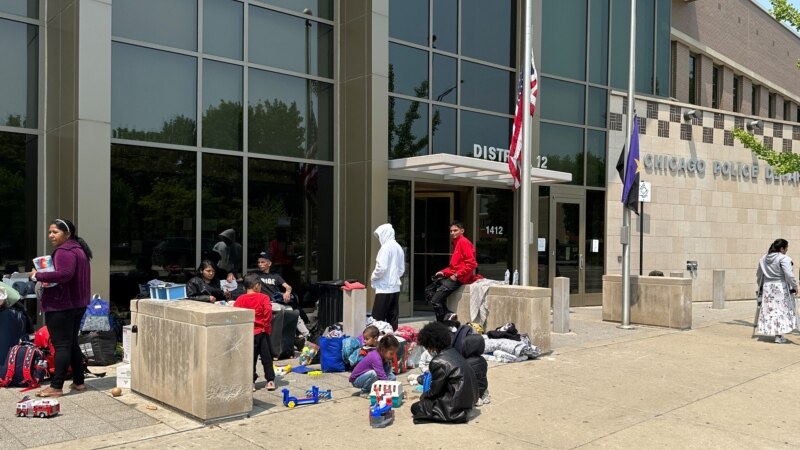
After a terrible experience of months fleeing from Venezuela, surviving to the dangerous journey Through Central America and Mexico to finally cross the southern US border, asylum seeker Lismar Pinto arrived by bus at a Chicago police station, where she remained on the lobby floor for eight days.
“It was hard, of course, at first, at least for us; we were at a station where there were sexual predators, or something like that, ”he explained to the voice of america through a translator. “We arrived with my two grandchildren, one 5 months old and the other 5 years old”.
Pinto, who arrived in the city in late April, is among the hundreds of migrants who arrive weekly in Chicago, which has become the destination for many like her and her fellow traveler, José Morán, who hope to start a new life here as their asylum cases progress through the US immigration system.
“The conditions in Venezuela are not a secret to anyone, there is no food security, there is no education, there is no health, there are no working conditions,” he commented. “It’s hard to live there because a salary is $20 a month. No one can live on $20 a month.”
Moran added: “Arriving here in Chicago we have new possibilities, they are giving us shelter, they help us with food, we have had medical attention and the children are studying in a school. They are enrolled, things have given a very important change in life”.
Conditions in Venezuela are not a secret to anyone.”
Chicago continues to deal with a wave of migrants, many from Central and South America, arriving in the Windy City after legally crossing the southern US border and then being transported there, often by bus, from states like Texas. Their arrival has overwhelmed police stations, shelters – or “rest centers” – and municipal aid services, forcing the city government to declare a state of emergency.
“This is a humanitarian crisis,” said Michael Rodriguez, a councilman for Chicago’s 22nd District, which is home to one of the largest Latino communities in the Midwest. It is one of the first stops where many migrants find temporary assistance.
“Right now, we only have about 2,800 beds in our shelter system, and we’re full, so parks and police stations are serving to temporarily house people. It’s a huge challenge and it’s costing a significant amount of money. resources”.
Non-profit organizations have mobilized to provide resources. Among them is New Life Centers, where Matt DeMateo serves as executive director.
“We really walk around with emergency food, feeding families, buying clothes, things like that, and there’s a strong network in Chicago that really involves these families,” DeMateo told the VOA.
Some 9,000 immigrants have been resettled in Chicago since September of last year. New Life Centers estimates that they have helped around a third of them.
“Families come here with absolutely nothing,” DeMateo said. “They come here hungry, tired, they’ve been through hell and over it to get here, and now they’re looking for new hope and opportunity.”
Food provided free of charge by New Life’s Pan De Vida grocery store draws hundreds daily, including José Molina Povedor, originally from Colombia.
“It’s really a blessing,” he told the VOA also through a translator. “Food is a bit scarce, work is scarce, so it’s very important here.”
Povedor will not be able to work legally in the US while his asylum case is resolved, so he volunteers at Pan De Vida while staying with relatives who already live in the city. “I’m waiting for help with my work permit, so I can work and be a good citizen of the United States,” he said.
DeMateo stressed that New Life centers are stepping up their efforts to get more migrants out of shelters.
“We are one of the major providers in the back end of the entire system where we are currently placing 10 families a day from shelters to apartments, and we hope to increase that to 500 families a month,” he said.
As the flow of immigrants to Chicago continues, Illinois city and state leaders are seeking federal help to meet the growing needs.
Connect with the Voice of America! Subscribe to our channel Youtube and activate notifications, or follow us on social networks: Facebook, Twitter and Instagram.














